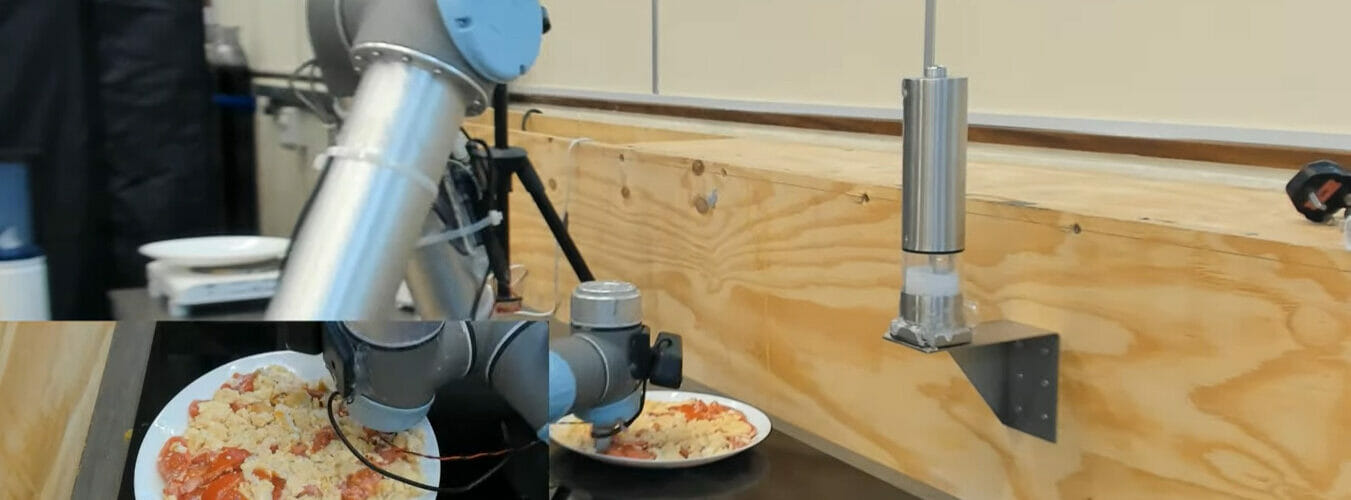In partnership with appliances manufacturer Beko, Cambridge University in the U.K. have developed a robot that can learn different types of tastes and flavors, similar to how mankind can taste different meals, by examining the saltiness of dishes.
Results from the tests were published in the journal Frontiers in Robotics & AI, and excerpts from the university press release explain further:
Their results could be useful in the development of automated or semi-automated food preparation by helping robots to learn what tastes good and what doesn’t, making them better cooks.
The robot chef, which has already been trained to make omelettes based on human taster’s feedback, tasted nine different variations of a simple dish of scrambled eggs and tomatoes at three different stages of the chewing process, and produced ‘taste maps’ of the different dishes.
To imitate the human process of chewing and tasting in their robot chef, the researchers attached a conductance probe, which acts as a salinity sensor, to a robot arm. They prepared scrambled eggs and tomatoes, varying the number of tomatoes and the amount of salt in each dish.
Using the probe, the robot ‘tasted’ the dishes in a grid-like fashion, returning a reading in just a few seconds.
To imitate the change in texture caused by chewing, the team then put the egg mixture in a blender and had the robot test the dish again. The different readings at different points of ‘chewing’ produced taste maps of each dish.
Their results showed a significant improvement in the ability of robots to assess saltiness over other electronic tasting methods, which are often time-consuming and only provide a single reading.
While their technique is a proof of concept, the researchers say that by imitating the human processes of chewing and tasting, robots will eventually be able to produce food that humans will enjoy and could be tweaked according to individual tastes.
In future, the researchers are looking to improve the robot chef so it can taste different types of food and improve sensing capabilities so it can taste sweet or oily food, for example.
When a robot is learning how to cook, like any other cook, it needs indications of how well it did. We want the robots to understand the concept of taste, which will make them better cooks. In our experiment, the robot can ‘see’ the difference in the food as it’s chewed, which improves its ability to taste.
Co-author Dr. Arsen Abdulali, from the Department of Engineering at Cambridge
Beko has a vision to bring robots to the home environment which are safe and easy to use. We believe that the development of robotic chefs will play a major role in busy households and assisted living homes in the future. This result is a leap forward in robotic cooking, and by using machine and deep learning algorithms, mastication will help robot chefs adjust taste for different dishes and users.
Dr. Muhammad W. Chughtai, Senior Scientist at Beko plc.
Chipotle Trials Autonomous Kitchen With New Tortilla Chip-Making Robot Chippy
AUTHOR COMMENTARY
The desire of the slothful killeth him; for his hands refuse to labour.
Proverbs 21:25
Instead of actually cooking and tasting your own food, the robots are now being created to do that for you. Give it a few more years, or less, and the restaurants will be automated completely.
This technology, when fully unveiled, will fit like a glove in the coming autonomous smart cities, where the masses’ minds will be plugged into the grid, so the AI will know how to create people’s favorite meals – making the bug and human-cannibal patties taste like whatever they want it to.
Agenda 2030: You’ll Own Nothing And Be Happy
Lo, this only have I found, that God hath made man upright; but they have sought out many inventions.
Ecclesiastes 7:29
[7] Who goeth a warfare any time at his own charges? who planteth a vineyard, and eateth not of the fruit thereof? or who feedeth a flock, and eateth not of the milk of the flock? [8] Say I these things as a man? or saith not the law the same also? [9] For it is written in the law of Moses, Thou shalt not muzzle the mouth of the ox that treadeth out the corn. Doth God take care for oxen? [10] Or saith he it altogether for our sakes? For our sakes, no doubt, this is written: that he that ploweth should plow in hope; and that he that thresheth in hope should be partaker of his hope. (1 Corinthians 9:7-10).
The WinePress needs your support! If God has laid it on your heart to want to contribute, please prayerfully consider donating to this ministry. If you cannot gift a monetary donation, then please donate your fervent prayers to keep this ministry going! Thank you and may God bless you.








Why do I reckon these robots will soon be reporting Bugs are yummy and Gates-Plastic meats are scrumptious!